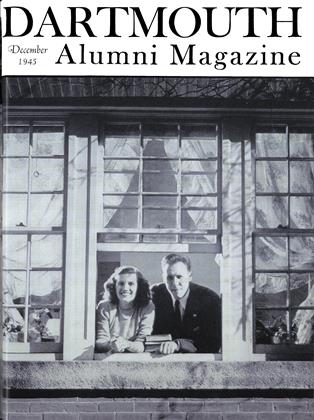THERE HAVE ALREADY been several volumes published on atomic energy and there will be innumerable more. A compendium of information has been compiled by Pocket Books, The AtomicAge Opens, which can be had for a quarter. But I think an essential book for all Americans to read is the official report on the development of the atomic bomb under the auspices of the United States Government, written by Henry DeWolf Smyth. The author is department head of physics at Princeton and was a consultant of "Manhattan District" where much of the work went on. This book, issued by the Princeton University Press, sells for only $2 and is called Atomic Energy for Military Purposes. It is pretty much a straightforward story of the development of atomic energy: "A weapon has been developed that is potentially destructive beyond the wildest nightmares of the imagination; a weapon so ideally suited to sudden unannounced attack that a country's major cities might be destroyed overnight by an ostensibly friendly power. This weapon has been created, not by the devilish inspiration of some warped genius (Mr. Mind), but by the arduous labor of thousands of normal men and women working for the safety of their country." You may go on from there.
Ploughman of the. Moon by Robert W. Service (Dodd, Mead, 1945) is the autobiography of the versifier of the Yukon. Here he tells how he created the immortal Sam McGee and the ballad of the lady that was known as Lou. He began as an amateur reciter of "Casey at the Bat," "Gunga Din," and other ballads. The idea came to him to write a dramatic ballad suitable for recitation, so he wrote the Shooting of DanMcGrew. The theme was revenge with the old triangle of the faithless wife, the be- trayed husband, and the lover. The scene is a Yukon saloon with the two men shooting it out and the story told by musical suggestion. Service heard noises of revelry from a bar and the first line came, "A bunch of boys were whooping it up," and he says the rest came easily and he wrote it stanza by stanza.
"There's a land and it beckons and beckons, And I want to go back, and I will."
But Service has not been back for thirty years and now he never will.
There is a kind of severe austerity in Service which kept him from degradation in his vagabonding days and he now looks like a distinguished retired minister of the gospel. His home is in France, but through the war he lived quietly in California.
Clifton Fadiman has supplied the growing market for Henry James with a well chosen anthology of James' short stories, recently published by Random House. Here you will find seventeen short stories, with discriminating introductions by Fadiman, dating from 1877 to 1909. You will not find here The Aspern Papers or the magnificent ghost story, The Turn of theScrew, which are too long for inclusion. However, it will please those readers who read James instead of playing lip service to his peculiar genius without ever opening his books. The latter are legion. I am nearly one of them myself.
George Stimpson, a Washington corres- pondent, has answered many questions about the Bible for young or old in his ABook About the Bible (Harper's, 1945). This book of more than five hundred pages is an excellent one for a household with children. It answers such questions as "Can a whale swallow a man whole?" (the sperm whale has a throat large enough to swallow a human being whole). "Who killed six hundred men with an ox goad?," "How many wives did Solomon have?," and literally hundreds of others.
I have been re-reading Scott Fitzgerald in the Viking Portable Library and his stature rises with each decade. This series contains his best novel, The Great Gatsby, also Tender is the Night and nine short stories. "The Offshore Pirate" is SEP confectionery, but "The Rich Boy" is something else again.
Robert Payne's Forever China (Dodd, Mead) is a magnificent picture of modern China written by a young man who can handle English with distinction, who sees with the eyes of a trained observer, and who comprehends with the understanding of a poet. Worth your money and your time.
The indefatigable H. L. Mencken contributes a scholarly and readable tome in Supplement One, The American Language. Mr. Mencken is now 65 but he writes with the gusto of a man who is a candidate for a six-day bicycle race. A finely printed volume which belongs on your shelves beside the Fourth Edition of TheAmerican Language.
 View Full Issue
View Full Issue
More From This Issue
-
 Article
ArticleTHE DEAN UNMASKED
December 1945 By HERBERT F. WEST '22, -
 Article
ArticleTHE VETERAN RETURNS
December 1945 By PROF. Wm. STUART MESSER, -
 Class Notes
Class Notes1945
December 1945 By ARTHUR NICHOLS, JOHN W. CALLAGHAN -
 Class Notes
Class Notes1917
December 1945 By MOTT D. BROWN, DONALD BROOKS -
 Article
ArticlePRESIDENT DICKEY INDUCTED
December 1945 -
 Class Notes
Class Notes1918
December 1945 By ERNEST H. EARLEY, DONALD L. BARR
HERBERT F. WEST '22
-
 Article
ArticleHANOVER BROWSING
January 1935 By Herbert F. West '22 -
 Article
ArticleHanover Browsing
June 1938 By HERBERT F. WEST '22 -
 Article
ArticleHanover Browsing
March 1948 By HERBERT F. WEST '22 -
 Article
ArticleHanover Browsing
May 1949 By HERBERT F. WEST '22 -
 Books
BooksTHE BLACK LILY
July 1951 By Herbert F. West '22 -
 Books
BooksWILD TRAIN: The Story of the Andrews Raiders
January 1957 By HERBERT F. WEST '22







